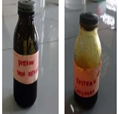Formulation and evaluation of antibacterial activity of hand sanitizers containing red betel (Piper crocatum) and white galangal (Alpinia galanga) extract

Downloads
Additional Files
Background: The COVID-19 outbreak has changed how people live worldwide, making hand hygiene a must, whether it involves hand sanitizer (HS). The majority of HS are made of alcohol. Several side effects of alcohol are dryness and allergies. Alternative natural ingredients and HS are needed. Red betel (Piper crocatum) and white galangal (Alpinia galanga) are familiar and easy to be found. These two plants have the potential to be the composition of HS because of their compounds, such as antioxidants, antibiotics, antifungals, and antivirals. However, there is a need for further research on their formulation and effectiveness in germ-killing.
Purpose: To formulate and identify the antibacterial activity of HS containing red betel and white galangal extract.
Method: Â This research was an in vitro laboratory experiment with several steps, including extraction, specific and nonspecific tests, formulation, and antibacterial activity tests.
Results: Red betel and white galangal leaves had been extracted at a concentration of 10% and formulated into HS. The HS containing 10% red betel extract produced an inhibition zone of 0 mm against E. coli and 1.05 mm against S. aureus, and the HS containing 10% White galangal extract produced an inhibition zone of 1.47 mm against E. coli and 1.40 mm against S. aureus.
Conclusion: Â The formulation of HS containing 10% of white galangal extract is more effective than the HS containing 10% of Red betel extract.
Authors retain copyright and grant the journal right of first publication with the work simultaneously licensed under a Creative Commons Attribution-NonCommercial 4.0 International License that allows others to share the work with an acknowledgement of the work's authorship and initial publication in this journal.
Authors are able to enter into separate, additional contractual arrangements for the non-exclusive distribution of the journal's published version of the work (e.g., post it to an institutional repository or publish it in a book), with an acknowledgement of its initial publication in this journal.
Authors are permitted and encouraged to post their work online (e.g., in institutional repositories or on their website) prior to and during the submission process, as it can lead to productive exchanges, as well as earlier and greater citation of published work (See The Effect of Open Access).

This work is licensed under a Creative Commons Attribution-NonCommercial 4.0 International License.











